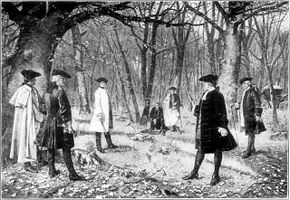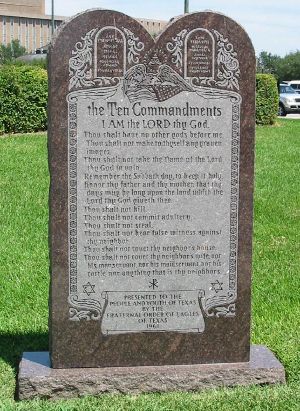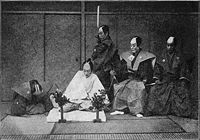Honor
Honor has become a guiding principle in Western society, from its earliest beginings, especially as it relates to a man's honor, his wife's honor, and his family's honor. In the picture at the right, Alexander Hamilton is seen defending his honor by accepting Aaron Burr's challenge to a duel.
In Juadeo Christianity, as well as Confuscinism, honor is defined as the high respect, esteem, reverence, admiration, or approbation shown, felt toward, or received by a deity or person. Confucius taught that we should love others and to honor one's parents
In East Asia, in lands such as Japan, honor was always seen as a duty (by Samurai, as well as by ordinary people.
Honor has been defined in more modern times as the evaluation of a person’s trustworthiness and social status based on an individual's statements and actions.
In many Muslim countries, women can be murdered if they are perceived as having brought dishonor to their family.
In some cultures, even in today's relatively modern world, people are guided by a culture of honor as opposed to a culture of law.
Ancient Times
The ancient Greek concepts of honor (timē) included not only the exaltation of the one receiving honor, but also the shaming of the one overcome by the act of hubris. This concept of honor is akin to a zero-sum game.
In Aristotle's ethics, honor is defined as one of the several virtues that are central to a well-lived life. In order to live well, we must develop an understanding and appreciation of acquiring several important qualities which define a human being. One of those qualities is honor. Aristotle's approach, however, emphasized the importance of reason in order to have a well-lived life.
Juadeo Christianity & Confucianism
In Juadism, honor is defined as the high respect, esteem, reverence, admiration, or approbation shown, felt toward, or received by a deity or person. There are many places in the Old Testament where honor is elevated to a high spiritual position. It is accorded to those in a position of authority (Gen. 45:13. It is achieved by heroism (Judg. 8:22; I Sam. 18:5), wisdom (Gen. 41:39; Prov. 3:16), or divine favor (I Sam. 24:7, 11). Honor is due to parents (Ex. 20:12; Deut. 5:16; Mal. 1:6) and the aged (Lev. 19:32; Lam. 5:12) since they embody wisdom (Job 32:7, 9). Those who have wealth (Prov. 14:24) and children (I Sam. 2:1) are also subject to honor since these possessions are a sign of God's favor. The honoring of father and mother is the fifth commandment in the Ten Commandments. Its importance is apparent from the fact that the declared reward for its observance is the lengthening of "thy days … upon the land which the Lord thy God giveth thee" (Ex. 20:12). The rabbis also emphasized that the observer of this commandment would enjoy reward both in this world and in the next (Pe'ah 1:1). Viewing it as a reflection of the godliness in man, they declared that the Bible equated the honor due to parents with that due to God (Ex. 20:12; Prov. 3:9) since "there are three partners in man, the Holy One blessed be He, the father, and the mother." According to the rabbis, when a man honors his father and his mother, God declares, "I ascribe merit to them as though I had dwelt among them and they had honored Me" (Kid. 30b
Catholics say that we are obligated to honor those who stand in any relation of superiority to ourselves. The most important relationship is between man and God. We must honor God by worshipping Him as our first beginning and last end, who is the infinite source of everything that we have. We honor angels and saints because of the gifts and graces bestowed on them by God. We honor our parents, from whom we received our earthly being, who brought us up and prepared us for the difficuties of life. Spiritual and temporal rules have a valid claim on receiving our honor by reason of the authority over us which they have received from God. We should honor the aged for their presumed wisdom, virtue, and experiences. We should always honor moral worth, wherever we find it. Official Catholic doctrine states that we may honor the highly talented, those who have been endowed with great beauty, strength, and dexterity, the well-born, and even the rich and powerful, for riches and power may, and should, be made the instruments of virtue and well-being.
Confucius taught that we should love others and to honor one's parents. This would contribute to the establishment of a civilized society and ultimately to world peace. Confucianism is a complex system of thought, involving moral, social, political, philosophical and religious thought that has a tremendous influence in Asia.
In East Asia, in lands such as Japan, honor was always seen as an almost-duty (by Samurai, but also the normal people). When you lost your honor or the situation made you lose it, there was only one way to save your dignity: death. Seppuku (vulgarly called "harakiri," or "belly-cutting") was the most honorable death in that situation. The only way for a Samurai to die more honorably was to be killed in a battle by a sword. Today, people in Japan, and Tahiti, hold on to their dignity and don't want their honor to be lost. As it was important for the Samurai or wives of dead Samurai who were forced to marry another in the earlier times, it now is important to all people who practice martial arts. Yet there are others who still stick to old Eastern values, even in a Western world.
Secular Terms
Honor has been defined as the evaluation of a person’s trustworthiness and social status based on an individual's statements and actions. Honor is that which defines a person's character: whether or not the person reflects honesty, respect, integrity, or fairness. Accordingly, a person's value and stature are based on the harmony of their actions, code of honor, and that of the society at large. Honor can be analyzed as a relativistic concept, i.e., conflicts between individuals and even cultures arising as a consequence of material circumstance and ambition, rather than fundamental differences in principle. Alternatively, it can be viewed as nativist — that honor is as real to the human condition as love, and likewise derives from the formative personal bonds that establish one's personal dignity and character.
Honor, sex, and violence
Traditionally, in Western society, honor figured largely as a guiding principle. A man's honor, that of his wife, his bloodfamily or his beloved, formed an all-important issue: the archetypal "man of honor" remained ever alert for any insult, actual or suspected: for either would impugn his honor.
However, the concept of honor appears to have declined in importance in the modern secular West. Popular stereotypes would have it surviving more definitively in alleged "hot-blooded" cultures (Italian, Persian, Arab, Iberian, etc.) or in more "gentlemanly" societies (like the "Old South" of Dixie). Feudal or other agrarian societies, which focus upon land use and land ownership, may tend to "honor" more than do deracinated industrial societies. Honor still prevails in the military (officers may conduct a court of honor) and in organisations with a military ethos, such as Scouting organizations.
Today, in many Muslim countries, such as Pakistan, women live under the constant threat of "honor killings." An honor killing is the murder of a person, almost invariably a woman, who has been perceived as having brought dishonor to their family. Such killings are typically perpetrated by the victim's own relatives and/or community, and unlike a crime of passion or rage-induced killing, it is usually planned in advance. Such killings are often regarded as a "private matter" for the affected family alone, and courts rarely become involved or prosecute the perpetrators.
"Honor" in the case of females is sometimes related, historically, to sexuality: preservation of "honor" equated primarily to maintenance of virginity of unattached women and to the exclusive monogamy of the remainder. One can speculate that feminism has changed some linguistic usage in this respect. Conceptions of honor vary widely between cultures; in some cultures, honor killing of (mostly female) members of one's own family are considered to be justified if the individuals have "defiled the family's honor" by marrying against the family's wishes, or even by being the victims of rape. Honor killings sometimes target women who choose boyfriends, lovers or spouses outside of their family's ethhic and/or religious community, or refuse to enter into an arranged marriage or seeking a divorce. Even the mere perception that a woman that a women has behaved in a way that "dishonors" her family is sufficient reason to trigger an attack on her life. These honor killings are generally seen in the West as a way of men using the culture of honor to control female sexuality. [1].
Cultures of honor and cultures of law
One can contrast cultures of honor with cultures of law. In a culture of law there is a body of laws that must be obeyed by all, with punishments for transgressors. This requires a society that can enact and enforce laws. A culture of law incorporates an unwritten social contract: members of society agree to give up most of their rights to defend themselves and retaliate for injuries, on the understanding that transgressors will be apprehended and punished by society. From the viewpoint of anthropology, cultures of honor typically appear among nomadic peoples and herdsmen who carry their most valuable property with them and risk having it stolen, without having recourse to law enforcement or government. In these situations, inspiring fear forms a better strategy than promoting friendship; and cultivating a reputation for swift and disproportionate revenge increases the safety of one's person and property. Thinkers ranging from Montesquieu to Steven Pinker have remarked upon the mindset needed for a culture of honor.
Cultures of honor therefore appear among the Bedouins, Scottish and English herdsmen of the Border country, and many similar peoples, who have little allegiance to a national government; among cowboys, frontiersmen, and ranchers of the American West, where official law-enforcement often remained out of reach, as is famously celebrated in Westerns; among the plantation culture of the American South, and among aristocrats, who enjoy hereditary privileges that put them beyond the reach of codes of law. Cultures of honor also flourish in criminal underworlds and gangs, whose members carry large amounts of cash and contraband and cannot complain to the law if it is stolen.
Once a culture of honor exists, it is difficult for its members to make the transition to a culture of law; it would require that people become willing to back down and refuse to immediately retaliate, and from the viewpoint of the culture of honor, this tends to appear to be an unwise act reflecting weakness.
One must distinguish the differences between a culture of honor and a culture of law, as it relates to different approaches on how one maintains his or her honor.
Other Contexts
In contemporary international relations, the concept of "credibility" resembles that of honor, as when the credibility of a state or of an alliance appears to be at stake, and honour-bound politicians call for drastic measures.
Compare the concepts of [integrity], [face (social custom)] in [stereotype]d East Asian cultures, or of [mana] in [Polynesia]n society. For a similar concept with many connotations opposite to honor, see shame.
In many countries the term honor can refer to an award given by the [state]. Such honors include military medals, but more typically imply a civilian award, such as a British [Order of the British Empire|OBE], a [knighthood] or membership of the French [Légion d'honneur].
See also, [List of prizes, medals, and awards].
See also {Wiktionarypar2|honour|honor}
- [Warrior Code]
- [Code duello]
- [Chivalry]
- [Honor code]
- [Honor killing]
- [Honor system], a philosophical way of running a variety of endeavours based on trust and honor
- [Honorary degree]
- [Feud#Blood Feuds/Vendetta|Vendetta]
- [Klingon culture]
Quotations
- "Mine honor is my life, both grow in one. Take honor from me, and my life is done. Then, dear my liege, mine honor let me try; In that I live, and for that I will die." — William Shakespeare, Richard II (1.1.182-185)
- "Honor thy father and thy mother; that thy days may be long upon the land which the Lord thy God giveth thee." — KJV Holy Bible (Exodus 20:12).
- "And for the support of this Declaration, with a firm Reliance on the Protection of the divine Providence, we mutually pledge to each other our Lives, our Fortunes, and our sacred Honor." — Thomas Jefferson [2] [3]
- "... during the time that the aristocracy was dominant, the concepts honor, loyalty, etc. were dominant, during the dominance of the bourgeoisie the concepts freedom, equality, etc." — Marx and Engels, The German Ideology.
- "I will to my lord be true and faithful, and love all which he loves and shun all which he shuns." — Anglo-Saxon oath as quoted in Civilization IV, similar to the Buddhist Oath of Refuge.
- "I will be forced to sink [the US ships], because even if I have one ship left I will proceed with the bombardment. Spain, the Queen and I prefer honor without ships than ships without honor.," Casto Méndez Núñez on the Valparaiso bombardment.
- "To die with honor, when one can no longer live with honor." — Giacomo Puccini, Madama Butterfly
- "Rather fail with honor than succeed by fraud" — Sophocles
- "In contrast to the purely economically determined "class situation" we wish to designate as "status situation" every typical component of the life fate of men that is determined by a specific, positive or negative, social estimation of honor. This honor may be connected with any quality shared by a plurality, and, of course, it can be knit to a class situation: class distinctions are linked in the most varied ways with status distinctions. Property as such is not always recognised as a status qualification, but in the long run is, and with extraordinary regularity." Max Weber
- "Peace is a precious and a desirable thing. Our generation, bloodied in wars, certainly deserves peace. But peace, like almost all things of this world, has its price, a high but a measurable one. We in Poland do not know the concept of peace at any price. There is only one thing in the lives of men, nations and countries that is without price. That thing is honor." — Józef Beck
ReferencesISBN links support NWE through referral fees
- Bowman, James. Honor: A History. Encounter Books, 2006. ISBN 1594031428. [Cf. excerpts from writings of James Bowman on Honor. Personal website of James Bowman. Accessed May 16, 2007.
- de Secondat, Charles, Baron de Montesquieu. The Spirit of the Laws. 2 vols. Originally published anonymously. 1748; Crowder, Wark, and Payne, 1777. Spirit of Laws. Online posting. constitution.org. Trans. Thomas Nugent (1750). Rev. J. V. Prichard. ("Based on an public domain edition published in 1914 by G. Bell & Sons, Ltd., London. Rendered into HTML and text by Jon Roland of The Constitution Society.") Accessed May 16, 2007. Published as Montesquieu: Spirit of the Laws. Eds. Anne M. Cohler, Basia Carolyn Miller, and Harold Samuel Stone. Cambridge Texts in the History of Political Thought. Cambridge, Eng.: Cambridge UP, 1989. ISBN 0521369746 (10). ISBN 978-0521369749 (13). (Paperback ed.; 808 pp.)
- [ [Richard E. Nisbett|Nisbett, Richard E.]], and Dov Cohen. Culture of Honor: The Psychology of Violence in the South. Westview, 1996. ISBN 0-8133-1993-5.
- Pinker, Steven. The Blank Slate: The Modern Denial of Human Nature. New York: Penguin Putnam, 2002. ISBN 0-670-03151-8.
- http://news.nationalgeographic.com/news/2002/02/0212_020212_honorkilling.html, August 18, 2007
- Honor, Mayer Gruber and Louis Rabinowitz, Encyclopaedia Judaica. Eds. Michael Berenbaum and Fred Skolnik, Vol.9. 2nd ed. Detroit:Macmillan Reference USA. 2007. p519-520. 22 vols, August 18, 2007
- http://www.newadvent.org/cathen/07462a.htm, August 18, 2007
Credits
New World Encyclopedia writers and editors rewrote and completed the Wikipedia article in accordance with New World Encyclopedia standards. This article abides by terms of the Creative Commons CC-by-sa 3.0 License (CC-by-sa), which may be used and disseminated with proper attribution. Credit is due under the terms of this license that can reference both the New World Encyclopedia contributors and the selfless volunteer contributors of the Wikimedia Foundation. To cite this article click here for a list of acceptable citing formats.The history of earlier contributions by wikipedians is accessible to researchers here:
The history of this article since it was imported to New World Encyclopedia:
Note: Some restrictions may apply to use of individual images which are separately licensed.



